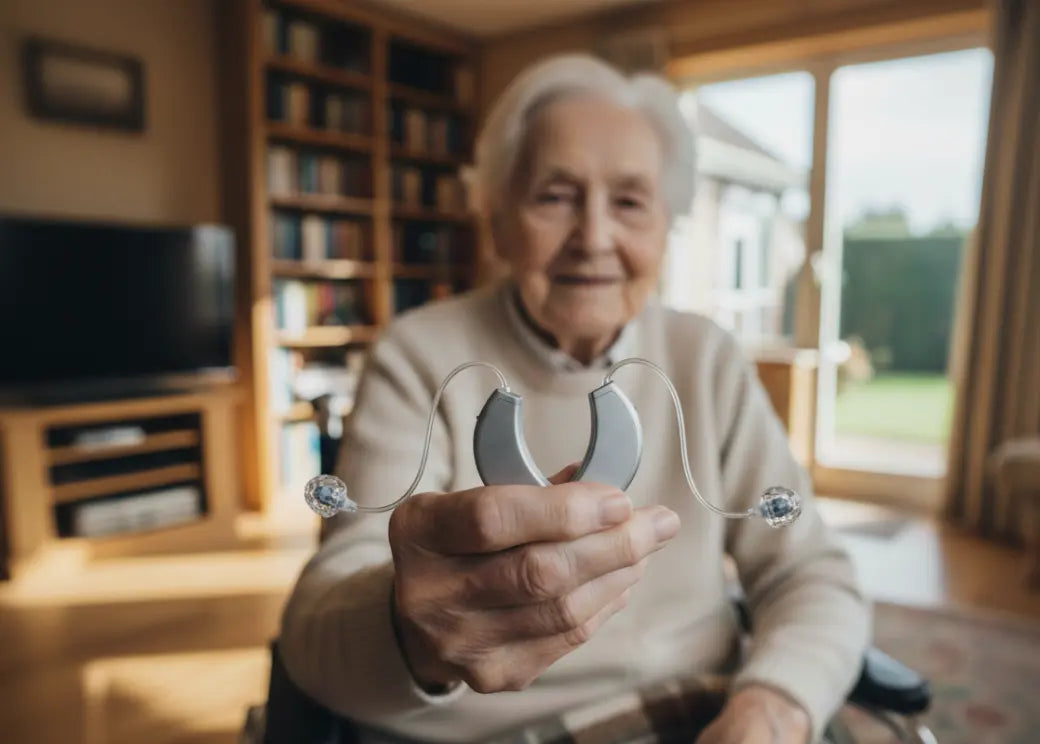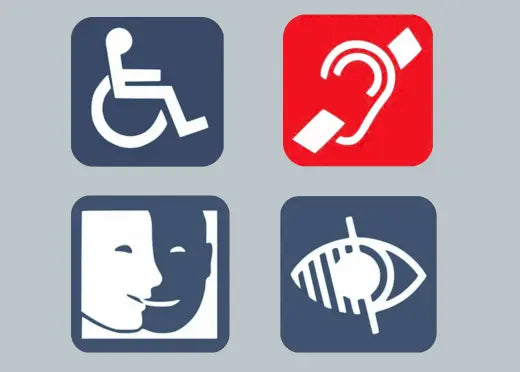In theory, hearing aids are the gold standard for correcting hearing loss. In practice, as soon as a person becomes dependent (cognitive impairment, limited motor skills, need for assistance with daily tasks), conventional hearing aids often become difficult, or even impossible, to use on a daily basis.
The result: many hearing aids remain in a drawer, while the elderly person continues to be unable to hear… even though their family and caregivers are doing their best. It is precisely in these situations that an alternative solution , simple and directly usable by relatives or caregivers, such as the Spokeo listening assistant , can make all the difference.
In this article, we will explain why hearing aids remain essential for independent people, but show their limitations in dependent people, and present the complementary options that exist to restore communication.
1. Hearing aids: a state of the art solution… for independent individuals
A highly effective medical device under good conditions
Hearing aids are sophisticated medical devices , fine-tuned by a hearing care professional based on an audiogram. They remain the best solution for someone who:
- can travel to ENT consultations and to the hearing aid specialist;
- understands the principle of the equipment and adheres to the project;
- is able to insert, remove, charge or change the batteries in its devices;
- can signal if something is wrong (pain, discomfort, whistling…) so that the settings can be adjusted.
Under these conditions, assistive devices are often very beneficial, and should remain the first option to consider when a complete care pathway is possible.
A structured care pathway… but demanding
To achieve effective equipment, several steps are necessary:
- medical consultation (general practitioner, then ENT specialist);
- performing an audiometric assessment ;
- testing different models of hearing aids;
- several adjustment and follow-up appointments over several weeks or months.
For an independent person, this route is realistic. For a very elderly person, someone who tires easily, lives in a nursing home, or is highly dependent, each step can become an obstacle, and daily use quickly becomes complicated.
2. When dependency makes the hearing aid difficult to use
Subtle gestures, too complex for some people
Even when properly adjusted, a hearing aid requires precise movements that become difficult for the elderly person, those with tremors, arthritis, or reduced hand mobility. The recommendations of the French National Authority for Health (HAS) for nursing homes (EHPADs) emphasize that handling hearing devices is among the most complex tasks for dependent residents, due to the delicate movements required.
- grab a tiny device and orient it correctly towards the ear canal;
- positioning an in-ear ear tip without hurting yourself;
- open a battery compartment, change a battery or charge a rechargeable device;
- manage the volume buttons or a mobile application.
For a dependent person, these tasks are often impossible to perform alone. A relative or caregiver must then take over, sometimes several times a day.
Cognitive impairment, confusion, refusal of assistive devices
Cognitive disorders (Alzheimer's, disorientation, dementia) further complicate the use of a hearing aid. The HAS (French National Authority for Health) emphasizes that residents with sensory and cognitive impairments frequently exhibit withdrawal, refusal, or spontaneous removal of the device , even when it is properly adjusted ( source: HAS ).
The person removes the device, misplaces it, puts it in a tissue, or throws it away without realizing it. For caregivers, maintaining the device under these conditions becomes very difficult, despite their best intentions.
Lack of time for staff in nursing homes and at home
In care facilities, the time available per professional is limited. According to the Fondation pour l'Audition (Hearing Foundation ), the management of hearing disorders in nursing homes requires regular support to check the condition of devices, clean them, manage batteries and monitor their use — actions that are difficult to integrate into an already very busy schedule.
Result: even with good equipment, its daily use becomes very unpredictable for dependent individuals.
3. The consequences of unsuitable equipment for dependent persons
Isolation, misunderstandings, and fatigue for everyone
When a dependent person cannot hear properly, even with hearing aids, communication becomes very difficult. The Hearing Foundation points out that uncompensated hearing loss in nursing homes leads to reduced social interaction , increasing misunderstandings, and a significant feeling of isolation.
- The elderly person answers indirectly, withdraws, seems absent;
- Relatives and caregivers must repeat this constantly ;
- Discussions are reduced to basic messages, impoverishing the human connection.
In the long term, this auditory isolation exacerbates cognitive decline and disorientation. The CNSA points out that the lack of access to clear communication leads to stress, anxiety, and social withdrawal among people with hearing loss.
Risks in healthcare or emergency situations
Not being able to hear properly during care, a medical consultation, or an emergency situation is a real risk factor . A dependent person who does not understand instructions may be afraid, agitated, refuse medical treatment, or fail to report significant pain.
The HAS (French National Authority for Health) recommendations on the management of sensory impairments emphasize that appropriate communication is essential to ensure safety during examinations, procedures, or changes in treatment. Without a simple communication tool to facilitate understanding, the risks of errors or tension increase significantly.
4. What alternatives exist for better communication with a dependent person?
Faced with these difficulties, the aim is not to oppose hearing aids and other solutions, but to complete the range of tools available for dependent people.
First, adapt communication attitudes
Even before discussing devices, a few simple best practices can make a big difference:
- position yourself facing the person, at eye level;
- speak slowly, distinctly , with short sentences;
- reduce background noise (television, radio, open doors);
- use gestures, facial expressions, visual aids.
These adjustments are useful with or without a hearing aid, and particularly valuable when the person is highly dependent.
Use a listening assistant for key situations
For people who can no longer manage a hearing aid on a daily basis, there are listening assistants designed to simplify access to the other person's speech as much as possible. The principle: instead of equipping the person permanently, the device temporarily improves conversation during the moments that matter most (medical appointments, meals, visits from loved ones, personal hygiene, activities, etc.).
The Spokeo listening assistant , for example, was designed specifically for elderly or dependent people:
- a wireless dual-conduction headset (air + bone conduction) that bypasses obstacles in the ear canal (earwax buildup, deformities, etc.);
- a remote microphone (Smart Mic) worn by the person speaking (caregiver, doctor, relative) which mainly captures their voice;
- a very simple setup , without complex settings or applications;
- It can be used at home, in nursing homes or in medical consultations.
The benefit for a dependent person: it is no longer their motor or cognitive abilities that determine the effectiveness of the solution, but the organization of their support network. Family members or care teams handle the setup, as the headset does not require delicate movements inside the ear.
To learn more about the organization in the facility, you can consult our dedicated article: Hearing aid in nursing homes: how to better support hearing-impaired residents .
5. Hearing aid or listening assistant: how to choose for a dependent person?
Ideally, the choice is not made “one against the other”, but based on the reality of the person’s daily life .
When a hearing aid remains the right option
Hearing aids should be the preferred option when the person:
- can follow a complete care pathway (ENT + hearing aid specialist);
- understands the benefit of the equipment and agrees to wear it;
- still has a certain degree of autonomy in everyday tasks;
- has a support network (family, caregivers) capable of providing some minimal assistance.
In these cases, a hearing aid, properly adjusted and monitored, remains the most suitable solution, especially for significant hearing loss.
When should you choose a solution like Spokeo?
A listening assistant solution like Spokeo becomes particularly relevant when:
- the person is very dependent (high GIR, significant cognitive impairments);
- She either does not tolerate the hearing aid or systematically removes it;
- the teams don't have time to manage complex devices;
- The main challenges are understanding instructions and the quality of the daily relationship.
In these situations, a simple listening assistant, without complicated settings, which is set up occasionally for a visit, a consultation or a moment of social life, can provide an immediate benefit without burdening daily life.
To discover in concrete terms how Spokeo works, you can consult the product page: Spokeo Box Set – Next generation listening assistant .
6. FAQ: Hearing aids and dependent individuals
My mother, who is in a nursing home, no longer uses her hearing aids, what should I do?
The first step is to discuss it with the healthcare team and, if possible, with the hearing aid specialist who fitted your mother. The goal is to understand what the problem is: physical discomfort, pain, lack of understanding, cognitive difficulties, refusal, overly complex movements…
If, despite adjustments, the devices remain underutilized or unused, it may be worthwhile to consider a complementary solution , such as a simple listening assistant that can be set up for key moments (visits, consultations, activities). A device like Spokeo , for example, allows you to focus your efforts on communication times when understanding is essential.
Does a listening assistant replace a hearing aid?
No. A listening assistant is not a medical device in the same sense as hearing aids. It does not replace a personalized hearing aid when this is possible, tolerated, and properly monitored.
On the other hand, for people who cannot fully benefit from a device (dependence, cognitive disorders, refusal, difficulties in handling), the listening assistant can be a concrete alternative to improve understanding during everyday exchanges.
How can we know if Spokeo can help a person with an addiction?
Spokeo was designed for people who:
- They can still hear the voice when someone speaks very close to their ear, but cannot hear at a distance;
- no longer tolerate or use their hearing aids;
- need help with all daily tasks;
- live at home or in an institution (nursing home, independent living residence, etc.).
If you recognize yourself in this situation, you can discuss it with the healthcare team or test the device in real-life, everyday situations. For more information, consult our Spokeo FAQ or contact us via the website form.
Key points to remember
- Hearing aids remain the standard solution for people who are sufficiently independent to follow a care pathway and manage their devices on a daily basis.
- In dependent individuals (cognitive impairments, limited motor skills, extreme fatigue), conventional equipment often becomes difficult to use reliably.
- Refusal to carry, losses, lack of time for the teams: the result is often a misunderstanding despite the investment made.
- Before changing devices, it is essential to adapt communication attitudes : position yourself facing the person, speak slowly, reduce background noise, use gestures.
- Listening assistants like Spokeo offer a simple alternative for dependent people, improving understanding during key moments (consultations, visits, care).
- The right choice is not “hearing aid or nothing”, but a combination of solutions adapted to the actual level of autonomy and the living context (home, nursing home, hospital).












